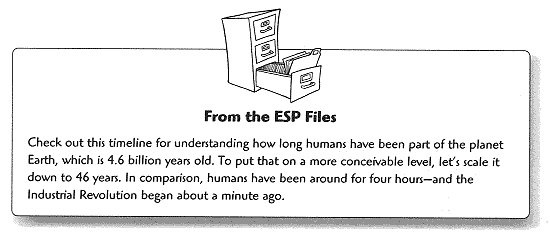|
|
|
|
|
|
|
Our Gaia Mind, Revisited: Do We Shape the Future? |
|
|
|
|
|
|
|
|
In the 1940s, James Lovelock, an English inventor and atmospheric chemist, proposed the ''Gaia Hypothesis." This is the idea, which we first discussed in Chapter 5, that the earth is actually its own entity, an enormous biological system that embodies a single living organism. Lovelock describes it thus: " . . . the biosphere is a self-regulating entity with the capacity to keep our planet healthy by controlling the chemical and physical environment." According to the principles of evolution, this living organism does whatever is necessary to ensure its own survival. |
|
|
|
|
|
|
|
|
 |
|
|
|
|
|
|
|
|
In the big picture of life on Earth, humankind's time and role thus far has been pretty insignificant. Yes, humankind has managed to wipe out countless species of plants and animals, but in doing so has led to our own demise . . . perhaps. The loss of other species is a warning of things to come: People can heed it, or ignore it. Either way shows a choice. Life goes onwhether it includes humans or not. The question is: If humans are just a part of a larger living organism, do they want to be an annoying toe fungus or a fresh set of brain cells? |
|
|
|
|
|
|
|
|
Ten years before Lovelock's idea surfaced, a visionary French Jesuit, who was also a paleontologist, biologist, and philosopher, put forth his ideas about humans interacting with the earth. Pierre Teilhard de Chardin (18811955) devoted his life to integrating Christian theology with scientific theories of evolution. In the process, he foresaw a convergence of the earth and humankind, which he called the "Omega point." |
|
|
|
|
|
|
|
|
Teilhard de Chardin proposed that a unity in human consciousness, motivated by the sense of the earth having its own spiritual identity, would lead to a new era of peace. He stated, "The Age of Nations is past. The task before us now, if we would not perish, is to build the Earth." With the earth as the guiding force of the future, humankind will come together with a united concern for preserving and progressing consciousness. Teilhard de Chardin called this new level of consciousness the noosphere. |
|
|
|
|
|